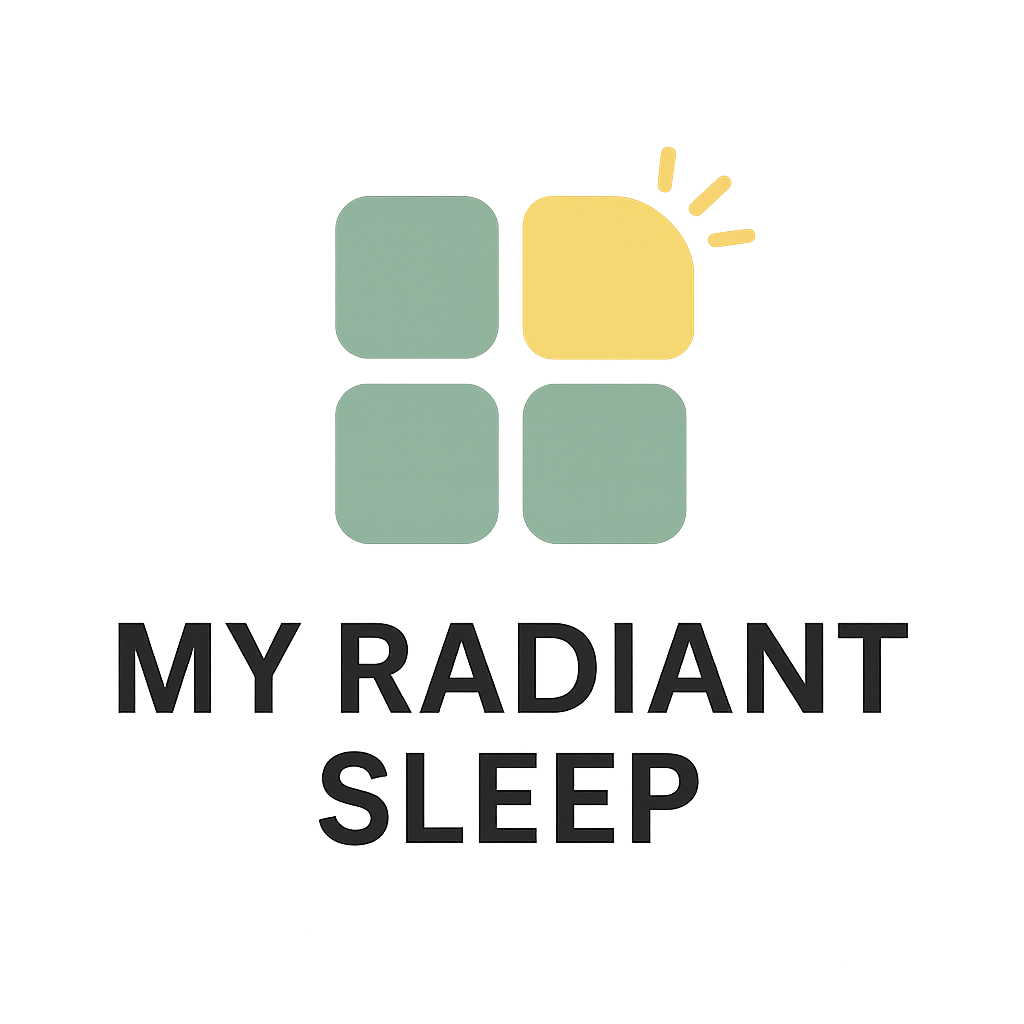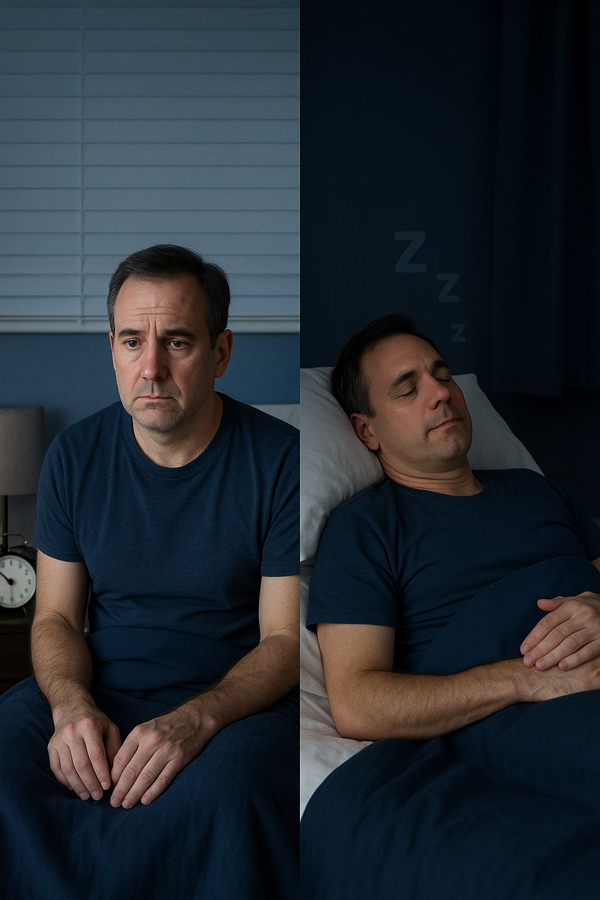What if your body had a built-in repair system that only activated while you rested? It does—and it’s called sleep.
According to the National Institute of Neurological Disorders and Stroke (NINDS), “Sleep affects almost every tissue in our bodies.” Yet many still underestimate its healing power.
As sleep science reveals, your brain and body undergo nightly repair, memory storage, immune strengthening, and more.
In this post, I will explore the real science behind how sleep heals you—physically, mentally, and emotionally—across four major areas:
- Brain detox and memory consolidation
- Tissue repair and immune recovery
- Sleep stage-specific healing
- Risks of sleep deprivation and poor sleep quality.
1. Brain Healing During Sleep

Understanding Brain Basics
Learning the brain basics of sleep helps us appreciate what happens while we rest. During non REM sleep, brain cells shift focus from processing external stimuli to performing cellular repair.
This change boosts overall brain health and memory retention. Sleep supports these critical internal processes from the very first sleep cycle.
The Glymphatic System: Brain Detox Mode
The glymphatic system is like the brain’s night crew—active only when the body sleeps deeply.
According to the American Brain Foundation, this system “flushes out harmful toxins and waste proteins, such as beta-amyloid.” This protein is associated with Alzheimer’s, and sleep helps prevent its buildup.
- During deep NREM sleep, brain waves slow, allowing cerebrospinal fluid to flow freely.
- This activity increases by over 60% compared to wakefulness, cleaning the brain at a cellular level.
- Sleep disturbances or even light exposure can interfere with this cleanup cycle, making the deep sleep stage even more important.

How Non REM Sleep Protects Brain Health
During non REM sleep, the brain performs critical maintenance functions. This phase supports brain health by allowing glial cells to clear waste, restore connections, and reduce inflammation. Deep sleep also aids in memory consolidation, helping you retain and process information collected during the day
My Verdict:
Deep sleep isn’t optional—it’s your brain’s nightly cleaning crew. Disrupting it means leaving toxins behind.
Memory Consolidation and Synaptic Pruning
Sleep not only clears waste—it strengthens what matters. As SleepFoundation.org explains, “During sleep, the brain replays recent memories and strengthens connections for long-term storage.”
- REM sleep integrates emotional and spatial memories.
- Slow-wave sleep stabilizes new information and prunes unnecessary connections.
- Disrupted sleep patterns impair memory encoding, affecting learning and mood.
The Cleveland Clinic affirms this, stating that sleep helps form and maintain the brain pathways responsible for learning and memory.
Repairing Neural Damage
Your brain isn’t idle while you sleep—it’s restoring itself. Glial cells proliferate during deep sleep, aiding tissue recovery and neuronal insulation.
- The Harvard Medical School Division of Sleep Medicine emphasizes that sleep is when “neuronal repair processes” are most active.
- These processes protect long-term brain health and help prevent neurological disorders.
If you struggle to get enough deep sleep, learning about core sleep and how it supports deep stage recovery can help you focus on the most restorative portion of the night.
2. Physical Body Restoration

Growth Hormone & Tissue Recovery
As you rest, your body gets to work healing. Growth hormone is released primarily during the deep sleep stage, facilitating muscle growth and tissue repair.
According to WebMD, “Without enough sleep, your body can’t repair muscle tissue, synthesize proteins, or release growth hormone.”
- Physical injury recovery speeds up with seven to nine hours of rest.
- Growth hormone supports blood vessel healing and wound closure.
- Sleep also supports collagen production, critical for skin and joint health.
Strengthening the Immune System
While you sleep, your immune cells are training for battle. As Cleveland Clinic notes, “Sleep can help your body fight infection. Your immune system releases cytokines that help promote sleep and fight off illness.”
- Lack of sleep reduces white blood cell count and slows cytokine production.
- Consistent sleep quality strengthens your ability to respond to viruses.
- People who average less sleep are more likely to get sick after exposure to pathogens.
My Verdict: Think of quality sleep as immune training. You’re either building defenses—or weakening them.
Cardiovascular Health and Metabolic Regulation
Sleep resets your heart, blood pressure, and metabolism—key systems for nightly restoration.
- During NREM sleep, blood pressure drops and body temperature decreases, lowering cardiovascular strain.
- According to UChicago Medicine, “Chronic sleep deprivation increases the risk of cardiovascular disease, obesity, and diabetes.”
- Proper rest also regulates insulin sensitivity and glucose metabolism.
Disrupted sleep-wake cycles throw off these mechanisms, increasing your risk of chronic illness.
Sleep and Cardiovascular Health
A good night’s sleep protects your heart. Without regular, restorative sleep, you may develop high blood pressure or cardiovascular strain.
Sleep regulates hormonal rhythms and relaxes arteries throughout the night long, reducing risk. Interrupted cycles can leave you feeling irritable and vulnerable to long-term complications if left unaddressed.
3. Sleep Stages and Their Healing Functions

Understanding the Sleep Cycle
You cycle through other sleep stages 4–6 times per night: light sleep, deep NREM, and REM. Each plays a role.
As Healthline reports, “Each stage serves a different purpose: memory processing, energy restoration, and cell repair.”
- Light Sleep: Calms the nervous system, lowers core temperature, and preps the body for deeper stages.
- Deep Sleep (Slow-Wave): Immune defense, cell regeneration, and hormone release occur here.
- REM Sleep: Brain active, high brain activity, emotional regulation, and learning integration.
Sleep imbalances—whether too little or too much—can cause unexpected side effects. Learn more in our post on whether too much sleep can cause headaches.
The Role of Circadian Rhythm in Regulating Sleep Cycles

Your circadian rhythm is your body’s internal clock, driven by light and temperature cues. It dictates when you feel sleepy or alert.
Disrupting this rhythm through irregular schedules or late-night screen time can impair sleep quality, making it harder to maintain consistent rest and overall health.
Deep Sleep: Physical & Emotional Reset
The deep sleep stage is your healing power phase. The Sleep Foundation confirms that deep sleep “is considered the most restorative sleep stage.”
- Reduces inflammation markers
- Increases blood flow to muscles
- Boosts immunity and tissue regeneration
It’s also the stage most impacted by conditions like obstructive sleep apnea, which fragments deep sleep with micro-arousals. To dive deeper into this cognitive process, explore why we sleep and how the brain uses rest to recover.
REM Sleep: Brainstorming & Coping Mechanisms
REM sleep mimics daytime brain waves, yet you remain immobile and unconscious.
- Emotions are processed and memories reorganized.
- NINDS explains that during REM, “Your brain is active and dreams occur… it plays a role in learning, storing memories, and balancing mood.”
Why Brain Activity Increases During REM Sleep
Despite physical stillness, brain activity surges during the REM stage. This is when vivid dreams occur, emotional processing unfolds, and neural circuits related to learning strengthen.
Increased activity supports creativity, mood regulation, and problem-solving—making REM a crucial part of cognitive and psychological recovery.
REM Sleep and Mental Clarity
The REM stage, also called rapid eye movement sleep, is where dreams occur and emotional processing unfolds.
This phase helps regulate mood, creativity, and resilience. When skipped, you may feel tired or mentally off. It's harder to stay awake, focused, or pleasant when REM stage cycles are repeatedly interrupted.
My Verdict:
Skipping REM is like hitting pause on emotional growth. You’ll still function—but you won’t flourish.
4. Consequences of Poor Sleep on Healing
Signs You’re Not Getting a Good Night’s Sleep
A good night’s sleep should leave you refreshed, focused, and emotionally stable. If you wake frequently, snore loudly, or feel groggy during the day, your sleep quality may be suffering.
Over time, these symptoms can impact your productivity, immune function, and long-term well-being.
What Happens When You Don’t Get Enough Sleep?
Missed sleep does more than make you feel sleepy—it delays healing, increases injury risk, and shortens life expectancy.
- The American Brain Foundation notes that insufficient sleep “can exacerbate symptoms of brain disorders, delay recovery, and increase risk of stroke.”
- Even a few nights of less sleep can slow wound healing and impair cognitive judgment.
One common cause of interrupted deep sleep is obstructive sleep apnea. Monitoring your sleep patterns using one of the top-rated sleep apnea monitors may help identify disruptions early.
Immune System and Inflammatory Response
The body becomes vulnerable when sleep patterns are erratic.
- Inflammation increases without regular sleep periods.
- Viral recovery times extend by up to 40% in people sleeping under six hours, according to multiple sleep studies.
- Avoid alcohol and blue-light screens near bedtime to prevent inflammation-promoting interruptions.
Mental Health Decline and Emotional Regulation
When you don’t sleep, you don’t think straight.
- Harvard researchers explain that daytime sleepiness, poor mood, and even hallucinations are linked to disrupted circadian rhythms.
- Healthline links chronic sleep disorder with “higher rates of depression and anxiety.”
The Hidden Costs of a Chronic Lack of Sleep

A chronic lack of sleep does more than make you tired—it increases your risk for obesity, depression, high blood pressure, and diabetes.
Sleep deprivation also weakens immune defenses and impairs brain function. Long-term neglect of sleep can have irreversible effects on both body and mind.
Long-Term Damage to Brain and Body
Over time, chronic problems sleeping may lead to:
- Memory loss and dementia
- Cardiovascular disease
- Weakened immunity and slower recovery
- Hormonal imbalance and weight gain
My Verdict: Sleep debt isn’t temporary. Without intervention, it becomes cellular damage—across body and brain.
How Disrupted Sleep Patterns Harm Brain and Body Health
Irregular sleep patterns can harm your brain health and physical resilience. When sleep is fragmented, the body struggles to enter restorative stages like deep sleep and REM.
This affects memory, hormone regulation, tissue repair, and emotional stability—creating a ripple effect of imbalance throughout your systems.
How to Improve Sleep and Promote Healing
Optimize Your Bedtime Routine
- Set a consistent bedtime—even on weekends—to regulate your internal clock.
- Dim bright lights 1 hour before bed to allow melatonin release.
- Ensure your bedroom is at a comfortable temperature (60–67°F).
- Avoid screens, caffeine, and alcohol in the evening.
- Wind down with calming habits like journaling or stretching.Establishing a sleep-friendly environment also includes minimizing noise and using blackout curtains to promote deeper rest.
How Body Temperature Affects Sleep Quality
Your body temperature naturally drops at night to signal sleep onset. Maintaining a cool sleep environment—between 60 and 67°F—helps the body relax and promotes better rest.
Fluctuations in temperature can interrupt deep sleep and lead to restlessness or frequent awakenings during the night.
Falling Asleep and Staying Asleep
Falling asleep may seem effortless, but many people struggle to unwind. Research shows that bright lights, screen time, and inconsistent routines negatively affect sleep latency.
Keeping a cool room and a quiet environment supports your body’s natural patterns, allowing closed eyelids to trigger melatonin and transition you into sleep.
Creating a healing sleep space is key to nightly recovery. Try upgrading your setup with bedding accessories that boost comfort and sleep quality.
Identify and Treat Sleep Disorders
If you're still tired after a full night, you might need medical support.
- Get a sleep study if you snore loudly, gasp in sleep, or wake up exhausted.
- Consider sleep medicine options like CPAP machines, melatonin, or behavioral therapy.
- The National Institute of Neurological Disorders and Stroke/ emphasizes that managing disorders like insomnia or apnea “improves not just sleep—but overall brain function.”
These interventions not only restore restful sleep but also reduce the risk of long-term health complications.
1. How to Support Your Brain’s Healing Process During Sleep
Steps:
- Establish a consistent bedtime to align your circadian rhythm.
- Avoid screens and blue light at least one hour before sleep.
- Keep your bedroom dark, quiet, and at a comfortable temperature.
- Prioritize seven to nine hours of uninterrupted sleep each night.
- Reduce alcohol and caffeine, which negatively affect REM and non-REM sleep stages.
2. How to Improve Sleep Quality for Better Physical Recovery
Steps:
- Engage in light exercise daily, but finish workouts at least 3 hours before bed.
- Maintain a cool sleeping environment to help lower body temperature.
- Eat a light dinner and avoid late-night snacking or heavy meals.
- Use blackout curtains and white noise to minimize sleep disturbances.
- Follow a bedtime routine that signals your body it’s time to rest.
3. How to Balance Hormones That Help Your Body Heal at Night
Steps:
- Wake up and go to sleep at the same time every day.
- Get early morning light exposure to regulate melatonin and cortisol.
- Avoid disrupting sleep with stimulants like nicotine or late-day coffee.
- Ensure you reach the deep sleep stage where growth hormone is released.
- Monitor stress levels through journaling, yoga, or breathing exercises.
Conclusion
Healing doesn’t happen only in hospitals—it happens every night in bed. Whether you’re recovering from illness, managing stress, or strengthening your brain, quality sleep is your foundation.
Thanks to decades of research—from Harvard to Cleveland Clinic—we know that seven to nine hours of sleep is a powerful prescription.
So the next time you're tempted to skimp on sleep, remember: you're not just resting—you're repairing.
Bookmark this article. Share it with someone struggling to sleep. And start tonight—by giving your brain and body the restoration they deserve.
FAQs
How Many Hours of Sleep Do You Really Need?
Wondering how much sleep you need? Most adults require seven to nine hours per night for optimal health. Less than that can leave you feeling groggy, mentally foggy, or physically drained. Over time, inadequate rest contributes to health problems, emotional instability, and poor performance at work or school.
Does your brain heal during sleep?
Yes, your brain undergoes essential healing during sleep. Neural connections are strengthened, damaged cells are repaired, and waste products are cleared. Deep non-REM sleep supports memory consolidation and brain detox, helping protect against cognitive decline and promoting overall brain health.
How does sleep allow the body to heal?
Sleep activates systems that promote cellular repair, immune regulation, and hormonal balance. As body temperature drops and brain waves slow, healing processes intensify—especially during non-REM sleep. A consistent good night’s sleep allows your body to repair damage and build resilience effectively.
How does the brain clean itself during sleep?
The brain clears toxins through the glymphatic system, which flushes waste using cerebrospinal fluid. This process mainly occurs during deep sleep, when closed eyelids and reduced brain activity allow optimal flow. It’s how your brain defends against disorders like Alzheimer’s and maintains long-term clarity.
REFERENCES
- American Brain Foundation. (n.d.). Why sleep matters for brain health. https://www.americanbrainfoundation.org/why-sleep-matters-for-brain-health/
- Cherney, K. (2020, December 14). Why do we sleep? Healthline. https://www.healthline.com/health/why-do-we-sleep
- Cleveland Clinic. (n.d.). Sleep basics. https://my.clevelandclinic.org/health/body/12148-sleep-basics
- National Institute of Neurological Disorders and Stroke. (n.d.). Brain basics: Understanding sleep. National Institutes of Health. https://www.ninds.nih.gov/health-information/public-education/brain-basics/brain-basics-understanding-sleep
- Sleep Foundation. (2023, January 17). Stages of sleep. https://www.sleepfoundation.org/stages-of-sleep
- UChicago News. (2022, March 7). How sleep affects human health: Explained. https://news.uchicago.edu/explainer/how-sleep-affects-human-health-explained
- WebMD. (n.d.). What sleep does to your body. https://www.webmd.com/sleep-disorders/ss/slideshow-sleep-body-effects







